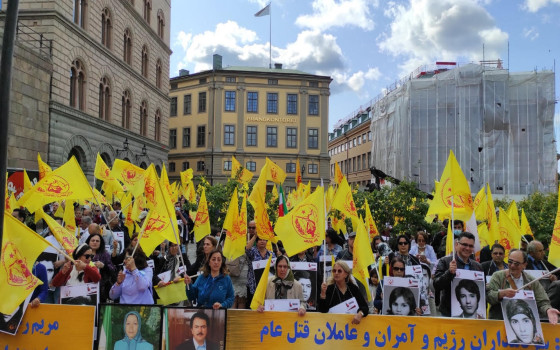
Iranian opposition: The downing of a presidential helicopter caused strong tremors in the regime, and signs of confusion appeared from the first moments.

- Europe and Arabs
- Tuesday , 21 May 2024 12:14 PM GMT
Paris - Tehran: Europe and the Arabs
Musa Afshar, a member of the Foreign Committee of the National Council of Resistance of Iran, said in a press statement that the helicopter crash, which led to the killing of President Ebrahim Raisi, Foreign Minister Hossein Amir Abdollahian, and a number of senior officials of the Iranian regime, caused strong tremors in the pillars of the mullahs’ regime. It also prompted Supreme Leader Ali Khamenei to take proactive steps to prevent the crisis from worsening.
Signs of confusion and anxiety:
Afshar pointed out that signs of confusion and anxiety appeared clearly in the regime from the first moments of the incident, as it sought to conceal the news and delay its announcement for about 18 hours, for fear of the consequences of this event and its impact on internal and external public opinion. According to what was stated in a press release distributed by the Iranian opposition, a copy of which we received
According to Afshar, the Supreme Security Council held an emergency meeting in Khamenei's office, where it issued strict instructions to the Revolutionary Guards and other repressive forces to raise their state of maximum alert in preparation for any emergency.
Afshar sent a strong message to the international community, demanding that Raisi be held accountable for the crimes he committed while holding various positions, especially during his work as Chief of the Judiciary in the 1980s, when he issued death sentences for many prisoners in the Karaj and Hamadan courts.
Raisi’s career in the Iranian regime:
Afshar explained that Ebrahim Raisi held sensitive positions in the Iranian regime during the past decades, starting with his assumption of the position of Deputy Public Prosecutor in Tehran in the early 1980s, where he played a major role in the massacre of prisoners in 1988, in which thirty thousand political prisoners were killed, the majority of whom were Mujahideen-e-Khalq. He also served as Deputy Head of the Judiciary and Prosecutor General of Iran, before Khamenei appointed him head of the Astan Quds Razavi Foundation, one of the largest financial institutions in the regime. Khamenei crowned Raisi's career by appointing him head of the judiciary in 2019, then president of the republic in 2021.
Khamenei's absolute confidence in my president:
Afshar pointed out that Khamenei's absolute confidence in Raisi goes back to their participation in the massacre of prisoners, which constituted a turning point in the history of the Iranian regime. Through this massacre, the regime was purged of its opponents, and its ranks were unified under Khamenei’s leadership.
Khamenei's plan to consolidate his power began by appointing Raisi to sensitive positions with great influence, starting with economic institutions, then the judiciary, and reaching the presidency.
The Revolutionary Guard’s control over all aspects of the state:
During the past five years, Khamenei continued to purge the various regime agencies, with the help of Raisi, which led to the Revolutionary Guards dominating all aspects of the state.
Afshar pointed out that Raisi’s presence at the head of the executive authority allowed the Revolutionary Guard to use all the state’s capabilities to serve its goals, including promoting war and exporting terrorism.
Afshar concluded his speech by emphasizing that the entire Iranian government is now at the service of the Revolutionary Guard
Rajavi: Raisi's death is a blow to Iran's execution system
Mrs. Maryam Rajavi, the elected president of the Iranian Resistance, said after the death of Ebrahim Raisi: The curse of the mothers and those demanding the prosecution of those involved in shedding the blood of the martyrs and the dead who remained steadfast in their positions, and the curse of God, the people and history are pursuing the butcher of the 1988 massacre.
A heavy and irreparable strategic blow to Khamenei and the entire system of executions and massacres, with consequences and crises affecting the entire religious tyranny, as it pushes the uprisings to move forward.
As we commemorate the souls of 30,000 mujahideen and freedom fighters who became martyrs in the 1988 massacre and will never be forgotten by the Iranian people, those involved in shedding the blood of the martyrs will continue to be prosecuted until they are overthrown.
The fate of all those who were executed and are being executed from Iran remains an example












No Comments Found